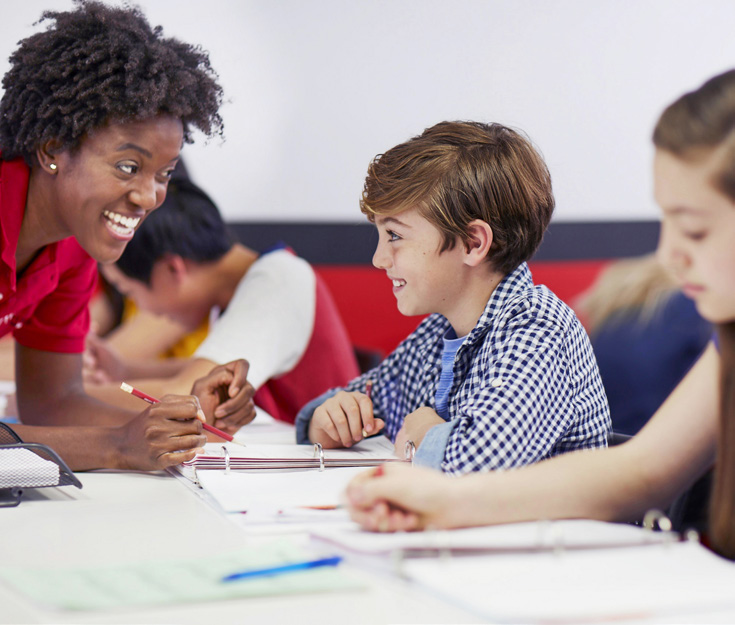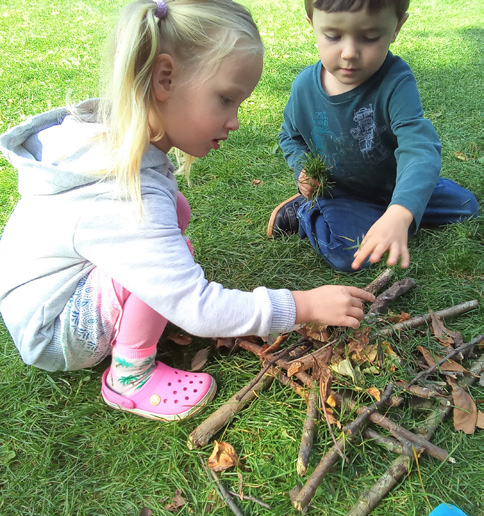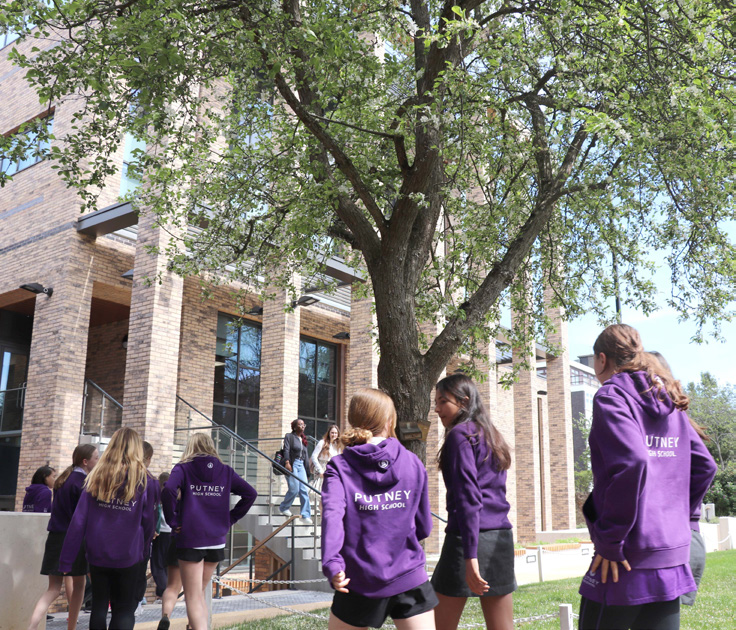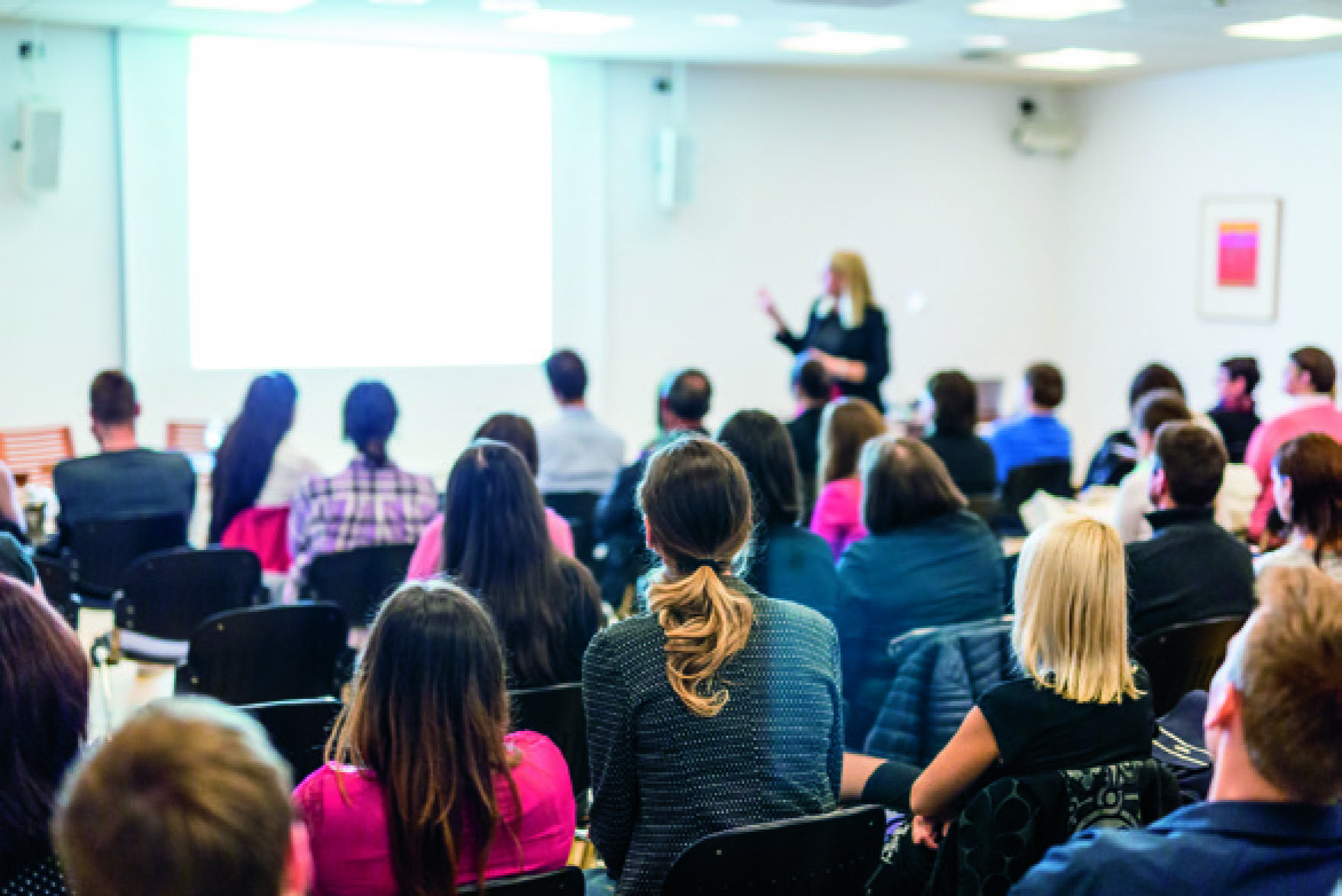Menu
 The first ever orchestra day was held at Woldingham School in Surrey this year. Bringing together children from local prep and feeder schools, a professional orchestra and Woldingham’s own players, it was billed as a ‘community celebration’ in the wake of the Covid pandemic.
The first ever orchestra day was held at Woldingham School in Surrey this year. Bringing together children from local prep and feeder schools, a professional orchestra and Woldingham’s own players, it was billed as a ‘community celebration’ in the wake of the Covid pandemic.
“Our orchestra day was a resounding success which only took place following the Covid experience and now we are planning to continue it,” says Jenny Rawlinson, Director of Communication at the girlsonly boarding school. “I think it’s fair to say students and staff appreciate the value of being together in live performances more than ever before.” As schools started a new academic year in September 2021, they were different, but how different? After the biggest upheaval to schooling since World War Two, it was always unlikely that they would return looking as they did before the outbreak of Covid-19. Woldingham’s orchestra day was just of one many items on the agenda for change as teachers across the country tried to “build back better.”
Online teaching is one of several innovations retained from lockdown days. Teachers have continued to film their lessons and stream them in real time or hold class gatherings on Microsoft Teams to teach children who are sick or who stay home to avoid bullying or other stresses. With absence rates still higher than pre-pandemic, some schools are also still holding parents’ evenings online – much to the approval of many families. As one parent put it, “virtual parents’ evenings mean I don’t have to rush from work, wait in queues as appointments with teachers go over time or listen to embarrassing disclosures about my child’s behaviour in public.”
 But most schools have also been eager, like Woldingham, to emphasise
But most schools have also been eager, like Woldingham, to emphasise
the importance of a timetable of face-to-face art, music, sport, drama and outdoor lessons as they help children catch up on the social and emotional learning they missed during lockdown. For many pupils, that absence has led to problems such as social anxiety and other mental health issues. Figures from NHS Digital show that one in six children in England had a probable mental health disorder in 2021, an increase from one in nine in 2017. Some schools, as well as offering plenty of arts and sports, have also brought in counselling, meditation, yoga, and other initiatives aimed at boosting children’s wellbeing.
At Putney High School, a fee-paying secondary school in south west London, headteacher Suzie Longstaff says: “We have launched initiatives including Mindfulness on Wednesdays, ‘Wellbeing drop-in sessions’ and a wellbeing podcast entitled ‘Thanks for Asking’. Putney also offers counsellors, a school nurse and personal tutors. But
its secret weapon is a cuddly, four-legged beast called Ezra – a therapy dog. Ezra “has broken down barriers and opened up conversations – perhaps challenging some of the stigma associated with getting therapeutic support,” says Longstaff. At Wimbledon High School play has been given a high priority with daily playtime made longer to allow children to focus on their friendships and invent their own fun. The school has also developed a ‘Wild Girls’ programme in the junior school to encourage children to explore “the wildlife on their doorstep.” It also now has a full-time in-house counsellor, offering coaching sessions to help the school’s youngest pupils “solve their own problems.”
| AN EDUCATION BEYOND THE CLASSROOM |
|---|
| We believe that the outcome of a good education shouldn’t be limited to academic achievements: it should be about the type of people our pupils become. We invest a great deal of time into ensuring they are thinking about their connection to the world beyond the school gates. We advocate equality and foster an ethos of social awareness and respect for difference, through regular talks, workshops and assemblies on equality, diversity and inclusivity. We have an extensive outreach programme and a number of longstanding partnerships with 30 local primary and secondary schools, as well as local care homes and libraries. Pupils from Year 10 and above spend Friday afternoons volunteering in our local community, from mentoring primary pupils in maths to leading adult digital skills classes. Our pupils are exposed to interesting perspectives and new ideas which serve to challenge their understanding of the world around them. They leave us as lifelong learners, conscious of their responsibility to society. Source: King’s College School |

At Bolingbroke Academy, Principal Claire Edis says children are being taught “courage and compassion”. And individual academic and mental health plans are devised for each child to help them “thrive in school and beyond” post-Covid.
Julie Robinson, Chief Executive of the Independent Schools Council (ISC), cites that in the post-pandemic world of education, more cross-sector partnerships between state and independent schools are being forged, triggered by a stronger sense of civic duty and driven by the genuine sense of the public benefit that private schools can provide.
“Children are getting involved in lots of community projects and the children are gaining a much broader view of the world,” she says. “Independent schools have found all these opportunities to do good things, and share it more. There is a positive spirit in schools now.”
But arguably the biggest change this year has been the return of national GCSE and A-level examinations. In the pandemic, exam papers were scrapped. Instead, grades were awarded on the basis of teachers’ assessment of their pupils work in class or in tests schools set internally. In the summer of 2022 for the first time in three years, teenagers again crowded into school halls to sit traditional exam papers.
| HOW TO DEVELOP A GROWTH MINDSET AND BUILD RESILIENCE |
|---|
| • Never say never – remind children that learning is all about not being able to do things at first – in the Lower School we use the power of the Yeti -I can’t do it YET – to reframe the way children think about problems • Let them take risks – the opportunity to tackle something outside of their comfort zones and learn how to overcome challenges is invaluable • Encourage them to take up a hobby that takes time – whether it’s learning an instrument or playing chess or sport. Nobody is perfect from day one – it takes time, resilience and determination, plus a lot of practice to succeed • Above all, remind them that success comes in many different forms – it’s not all about win or lose. Source: Northwood Schools |
Concern about children’s wellbeing after the pandemic led some private schools including Eton College and St Paul’s Girls’ School to propose scrapping GCSEs outright. The government has resisted such a radical step but it is bringing in a new GCSE in Natural History which will allow youngsters to study flora and fauna outdoors and learn how to protect the planet. The ‘climate change GCSE’ as it has been dubbed will be available from 2025 and is one of the first new GCSEs to be announced since 2017.
| DIVERSITY IN CHILDREN’S LITERATURE |
|---|
| • Never say never – remind children that learning is all about not being able to do things at first – in the Lower School we use the power of the Yeti -I can’t do it YET – to reframe the way children think about problems • Let them take risks – the opportunity to tackle something outside of their comfort zones and learn how to overcome challenges is invaluable • Encourage them to take up a hobby that takes time – whether it’s learning an instrument or playing chess or sport. Nobody is perfect from day one – it takes time, resilience and determination, plus a lot of practice to succeed • Above all, remind them that success comes in many different forms – it’s not all about win or lose. Source: Northwood Schools |
Some independent schools such as Thomas’s, Battersea, where Prince George and Princess Charlotte are pupils, are already holding increasing numbers of lessons outside, a tested way of boosting wellbeing and resilience. Under the school’s new curriculum, George will learn to kindle a fire outdoors and use a knife to whittle wood. Headteachers have also recognised the pressure on younger children caused by highly competitive admission tests to senior fee-paying schools. Since 1903 the Independent Schools Examinations Board (ISEB) has provided exams for children moving from prep and junior schools to senior schools in the UK, including designing and setting Common Entrance tests. The exams have traditionally tested 12- and 13-year-olds on up to 11 academic subjects, including Maths and Classics. Typical questions have included ‘What is the French for ‘his mother takes him to school’?’ And ‘How have polar bears adapted to living in the Arctic?’
But now changes are afoot
In 2019, not long before the pandemic began, the ISEB announced that Britain’s oldest exams were to be reformed. The move followed the decision by several top private schools, including Westminster and St Paul’s to abandon Common Entrance for children approaching the age of 13 and recruit more children from state primary schools at the age of 11. Hot-housing and intensive coaching for admissions tests to highly selective senior schools had also been blamed for growing levels of anxiety in young children.
The board has now brought in online pre-tests to Common Entrance. Pupils in Year 6, aged ten and 11, can sit the computerised pre-tests in their existing primary and prep schools as well as take a new iPQ, a project-based qualification devised by the ISEB. Prep and junior schools are adjusting the way they teach to the new qualifications.
 At Broomwood Hall Upper School, part of the Northwood Schools group, which has placed pupils in senior schools including London day schools such as Alleyn’s and JAGS as well as in boarding schools like Wellington College, preparation for the new pre-tests are already bedded in.
At Broomwood Hall Upper School, part of the Northwood Schools group, which has placed pupils in senior schools including London day schools such as Alleyn’s and JAGS as well as in boarding schools like Wellington College, preparation for the new pre-tests are already bedded in.
Louisa McCafferty, Head of Broomwood Hall, says senior schools are using the pre-entrance tests to select pupils in different ways. “Some schools, such as Alleyn’s, use the pre-tests to sift out up to half of the candidates applying while others look at the results as part of a package that includes English, Maths and Reasoning tests and interviews that are taken after the pre-tests,” she says.
Although the pre-test was designed to be an exam that could not be coached for – easing the hot-housing of young children that had previously taken place – in fact McCafferty says, “it’s a red rag to a bull to say to a school that no-one is expected to prepare for it.”
At Broomwood, a long 8am to 5.30pm day means pupils can combine personalised coaching for the computerised pre-tests with a normal timetable including art and music, she explains. “The London day market is so competitive, with up to seven children competing for each place, and many children sitting tests for four or five schools. However much you say to parents this is just a cognitive test, there are schools that now prepare for it,” she says. “The good thing about the pre-tests is that you can sit them at your own school and you only sit one pre-test. But the flip side is that if it does not go well that day that result hangs over you for all your applications.
| SUSTAINABILITY AND THE NEXT STEPS |
|---|
| Sustainability matters to us and there is much we can do for better environmental outcomes. We need to lead with action, but we want our students to see how they can be part of that leadership. Our student Green Council has been excellent in encouraging the community to think about paper, plastic, transport and our consumption of meat, for example, but the big difference globally will be made by making significant changes and investment on a large scale. One of the goals we have set for the school is to become carbon neutral as quickly as possible, and we intend to make significant progress towards this in the next three years, specifically tackling electrical energy, heating and the use of flights for overseas trips. The aim is that our students will leave us as well-informed young people who care about our environment, with the confidence and motivation to be part of the change process that we will need on a global scale. Source: Trinity School |
 It can be hard to get other schools to look at you if you do not do well in the pre-test.”
It can be hard to get other schools to look at you if you do not do well in the pre-test.”
“We do not teach to the test but we teach them how to handle this kind of test, we teach things like how much time to spend on each question, or to look for the red herring in a multiple choice series of questions,” says Hannah Rix, Assistant Head of Assessment at Broomwood Hall.
Rix argues that children’s stress and anxiety levels are lowered by being thoroughly prepared for the specific tests they will face at different schools. Parents are kept in the loop too. “Parents find it really hard to keep things relaxed. One of the things we do is ensure we keep parents informed. We hold sessions for them and explain what preparation for tests aged ten, 11 and 13 look like. The amount of hearsay and anxiety that goes round can be detrimental to the pupil.”
| THE IMPACT OF ARTIFICIAL INTELLIGENCE ON EDUCATION |
| Artificial Intelligence will eradicate the one-size-fits-all approach to education says Kai-Fu Lee, former president of Google China. His book, AI 2041, predicts the automation of many teacher’s tasks utilising sufficiently advanced AI, to correct students’ errors, answer questions, assign homework and tests and grade them. Plus bring historical characters back to life to interact with students. The greatest advance will be in individualised learning, using a personalised AI tutor assigned to each student to give a different homework to each pupil based on his/her pace, ensuring that each student achieves full mastery of a topic before moving on. Human teachers will play two important roles: as mentors and connectors, stimulating students’ critical thinking, creativity, empathy and teamwork; and a clarifier when a student is confused, a confronter to quell complacency and a comforter to subdue frustration. “In other words, teachers can focus less on the rote aspects of imparting knowledge and more on building emotional intelligence, creativity, character, values and resilience in students,” says Kai-Fu Lee. |
Parents are also turning to private tutors to coach children for the admission tests as well as for GCSE and A-level. One big change here according to Charles Bonas
of the tutoring agency Bonas Macfarlane, is that much tutoring has stayed online, bringing the price down to a starter level of around £35 an hour.
To help children catch up on the months of lessons lost due to Covid-19 forcing school closures, the government has also brought in a parent pledge, promising free catch-up tutoring through state schools for children who have fallen behind. Some of the one-to-one sessions are held remotely, others in schools. They are of mixed quality and the national programme has also been criticised for delivering too few tutoring sessions to meet demand.
| LONDON CALLING |
|---|
| Living in London can offer a spectrum of environments, so does a central location offer anything above a quieter London suburb? Central London schools have access to everything a major capital city has to offer. The world’s best museums, art galleries and historic monuments are on the doorstep. All can be integrated into a lesson or short trip with ease – just a quick tube ride or a short walk away, allowing for more engaging and creative learning without disrupting the timetable. The heart of the city also offers access to sports facilities and specialist trainers not normally available at school – cricket training at Lords, use of specialist facilities like horse riding in Hyde Park or boxing at a professional training gym. London is a multicultural city and that environment can provide a real-life education. Learning about other cultures and nationalities, respecting and valuing diversity and helping children learn more about themselves. Being in the heart of London is a beautiful, exciting and inspiring educational experience – a privilege for any student. |
Above all, schools have built back better in the past year by recognising and emphasising the value of human connection, creating new opportunities for children to play and work together in teams, orchestras, bands, groups and lessons. At Woldingham, Jenny Rawlinson says that the best advice she can give to parents supporting their children in the new post-pandemic normal is: “support your child to make the most of opportunities to do things in a group whether that is sport, music or drama, and to value simply being with friends and family in person. For many people it’s the personal connections with other people that make the most difference.” At Putney, Suzie Longstaff agrees: “We have all learnt the value of in person ‘In Real Life’ interactions. Time spent with friends doing things we enjoy is hard to beat.”
| COMMUNICATION IS KEY |
|---|
| The last two years have reminded us that humans are social beings, created to connect. Even though we see unprecedented digital connectivity, nothing can replace the power of face-to-face communication. When the whole family shares time together and uses it to communicate well, there is a tangible shift in relationships at home.• Increase shared mealtimes where conversation can flow freely • Have regular digital detox days where all mobile devices are turned off, proven to improve person-to-person connection • Plan days out that focus on your children’s passions as this will demonstrate a willingness to share your child’s dreams for the future.Source: Thames Christian School |